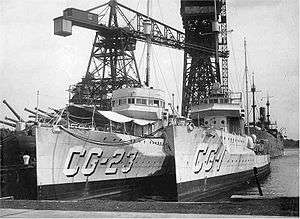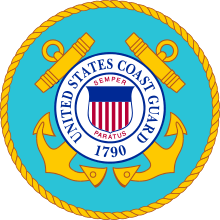Rum Patrol
| Rum Patrol | |
|---|---|
 Rum Patrol ships USCGD Tucker and USCGD Cassin, circa 1930. | |
| Objective | Enforce prohibition in United States waters. |
| Date | 1920 – 1933 |
| Executed by |
|
The Rum Patrol was an operation of the United States Coast Guard to interdict liquor smuggling vessels, known as "rum runners" in order to enforce prohibition in American waters. On 18 December 1917, the 18th Amendment to the Constitution was submitted to the states by Congress. On 16 January 1919, the amendment was ratified and the Liquor Prohibition Amendment, which prohibited the manufacture, sale, transportation, importation, or exportation of intoxicating liquors, came into effect on 16 January 1920.
Origin
The establishment of prohibition gave rise to smuggling of illicit liquor into the United States and, to deal with this problem, twenty-five destroyers were transferred by the United States Navy to the Treasury Department for service with the Coast Guard. Some began to show signs of wear and tear after the often arduous pace of operations on the Rum Patrol and required replacement. Accordingly, six of the newer flush deck destroyers were transferred to the Treasury Department in 1930–1932.
It was thought that adapting these older vessels for Coast Guard service would be less costly than building new ships. In the end, however, the rehabilitation of the vessels became a saga in itself because of the exceedingly poor condition of many of these war-weary ships. In many instances, it took nearly a year to bring the vessels up to seaworthiness. Additionally, these were by far the largest and most sophisticated vessels ever operated by the service, and trained personnel were nearly nonexistent. As a result, Congress authorized hundreds of new enlistees. These inexperienced men generally made up the destroyer crews.
Some of the destroyers were pre-World War I 742-ton "flivvers", capable of over 25 kn (29 mph; 46 km/h) — an advantage in the rum-chasing business. They were, however, easily outmaneuvered by smaller vessels. The destroyers’ mission, therefore, was to picket the larger mother ships and prevent them from off-loading their cargo onto the smaller, speedier contact boats that ran the liquor into shore.
On 20 February 1933, the 21st Amendment to the Constitution, the repeal of Amendment 18, was proposed by Congress and ratification was completed on 5 December 1933. This eliminated the need for the Rum Patrol. The remaining destroyers were returned to the Navy and sold for scrap.
Ships of the Patrol
| Coast Guard designation | Navy designation | Ship Class | USCG Acquired | USCG Commissioning | USCG Decommissioning |
|---|---|---|---|---|---|
| USCGD Cassin (CG-1) | USS Cassin (DD-43) | Cassin class | 28 April 1924 | 30 August 1924 | 5 June 1933 |
| USCGD Conyngham (CG-2) | USS Conyngham (DD-58) | Tucker class | 7 June 1924 | 8 March 1925 | 5 June 1933 |
| USCGD Cummings (CG-3) | USS Cummings (DD-44) | Cassin class | 7 June 1924 | 15 May 1925 | 30 April 1932 |
| USCGD Downes (CG-4) | USS Downes (DD-45) | Cassin class | 28 April 1924 | 14 October 1924 | 18 November 1930 |
| USCGD Ericsson (CG-5) | USS Ericsson (DD-56) | O'Brien class | 7 June 1924 | 28 May 1925 | 30 April 1932 |
| USCGD McDougal (CG-6) | USS McDougal (DD-54) | O'Brien class | 7 June 1924 | 13 May 1925 | 26 May 1933 |
| USCGD Porter (CG-7) | USS Porter (DD-59) | Tucker class | 7 June 1924 | 20 February 1925 | 5 June 1933 |
| USCGD Ammen (CG-8) | USS Ammen (DD-35) | Paulding class | 28 April 1924 | 22 January 1925 | 18 May 1931 |
| USCGD Beale (CG-9) | USS Beale (DD-40) | Paulding class | 28 April 1924 | 26 October 1924 | 1 June 1930 |
| USCGD Burrows (CG-10) | USS Burrows (DD-29) | Paulding class | 7 June 1924 | 30 June 1925 | 14 February 1931 |
| USCGD Fanning (CG-11) | USS Fanning (DD-37) | Paulding class | 7 June 1924 | 30 May 1925 | 12 August 1930 |
| USCGD Henley (CG-12) | USS Henley (DD-39) | Paulding class | 16 May 1924 | 14 November 1924 | 30 January 1931 |
| USCGD Jouett (CG-13) | USS Jouett (DD-41) | Paulding class | 28 April 1924 | 23 August 1924 | 16 May 1931 |
| USCGD McCall (CG-14) | USS McCall (DD-28) | Paulding class | 7 June 1924 | 17 June 1925 | 12 August 1930 |
| USCGD Monaghan (CG-15) | USS Monaghan (DD-32) | Paulding class | 7 June 1924 | 30 June 1925 | 29 January 1931 |
| USCGD Upshur (CG-15) | USS Abel P. Upshur (DD-193) | Clemson class | 5 November 1930 | 12 January 1931 | 21 May 1934 |
| USCGD Patterson (CG-16) | USS Patterson (DD-36) | Paulding class | 28 April 1924 | 24 November 1924 | 1 April 1930 |
| USCGD Badger (CG-16) | USS George E. Badger (DD-196) | Clemson class | 1 October 1930 | 20 March 1931 | 21 May 1934 |
| USCGD Paulding (CG-17) | USS Paulding (DD-22) | Paulding class | 28 April 1924 | 23 January 1925 | 12 August 1930 |
| USCGD Herndon (CG-17) | USS Herndon (DD-198) | Clemson class | 13 September 1930 | 7 March 1931 | 28 May 1934 |
| USCGD Roe (CG-18) | USS Roe (DD-24) | Paulding class | 7 June 1924 | 30 May 1925 | 4 March 1930 |
| USCGD Hunt (CG-18) | USS Hunt (DD-194) | Clemson class | 13 September 1930 | 5 February 1931 | 28 May 1934 |
| USCGD Terry (CG-19) | USS Terry (DD-25) | Paulding class | 7 June 1924 | 30 June 1925 | 12 August 1930 |
| USCGD Wood (CG-19) | USS Welborn C. Wood (DD-195) | Clemson class | 1 October 1930 | 15 April 1931 | 21 May 1934 |
| USCGD Trippe (CG-20) | USS Trippe (DD-33) | Paulding class | 7 June 1924 | 24 June 1924 | 15 April 1931 |
| USCGD Semmes (CG-20) | USS Semmes (DD-189) | Clemson class | 25 April 1932 | 25 April 1932 | 20 April 1934 |
| USCGD Davis (CG-21) | USS Davis (DD-65) | Sampson class | 25 March 1926 | 4 September 1926 | 5 June 1933 |
| USCGD Shaw (CG-22) | USS Shaw (DD-68) | Sampson class | 25 March 1926 | 13 July 1926 | 5 June 1933 |
| USCGD Tucker (CG-23) | USS Tucker (DD-57) | Tucker class | 25 March 1926 | 29 September 1926 | 5 June 1933 |
| USCGD Wainwright (CG-24) | USS Wainwright (DD-62) | Tucker class | 2 April 1926 | 30 July 1926 | 29 March 1934 |
| USCGD Wilkes (CG-25) | USS Wilkes (DD-67) | Sampson class | 25 March 1926 | 23 August 1926 | 29 March 1934 |
